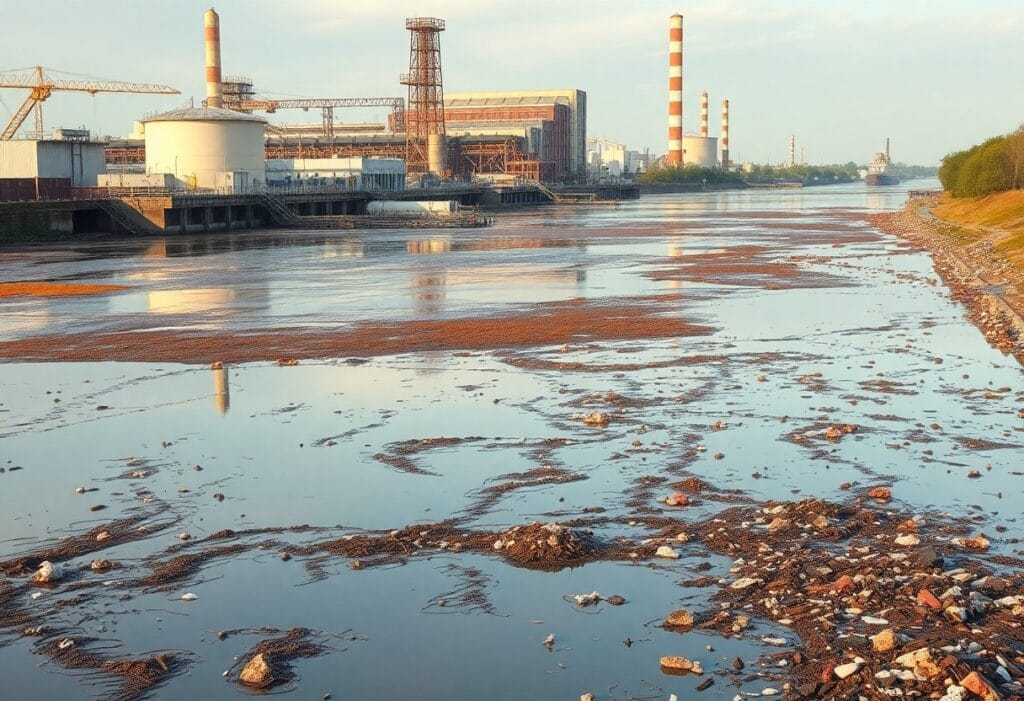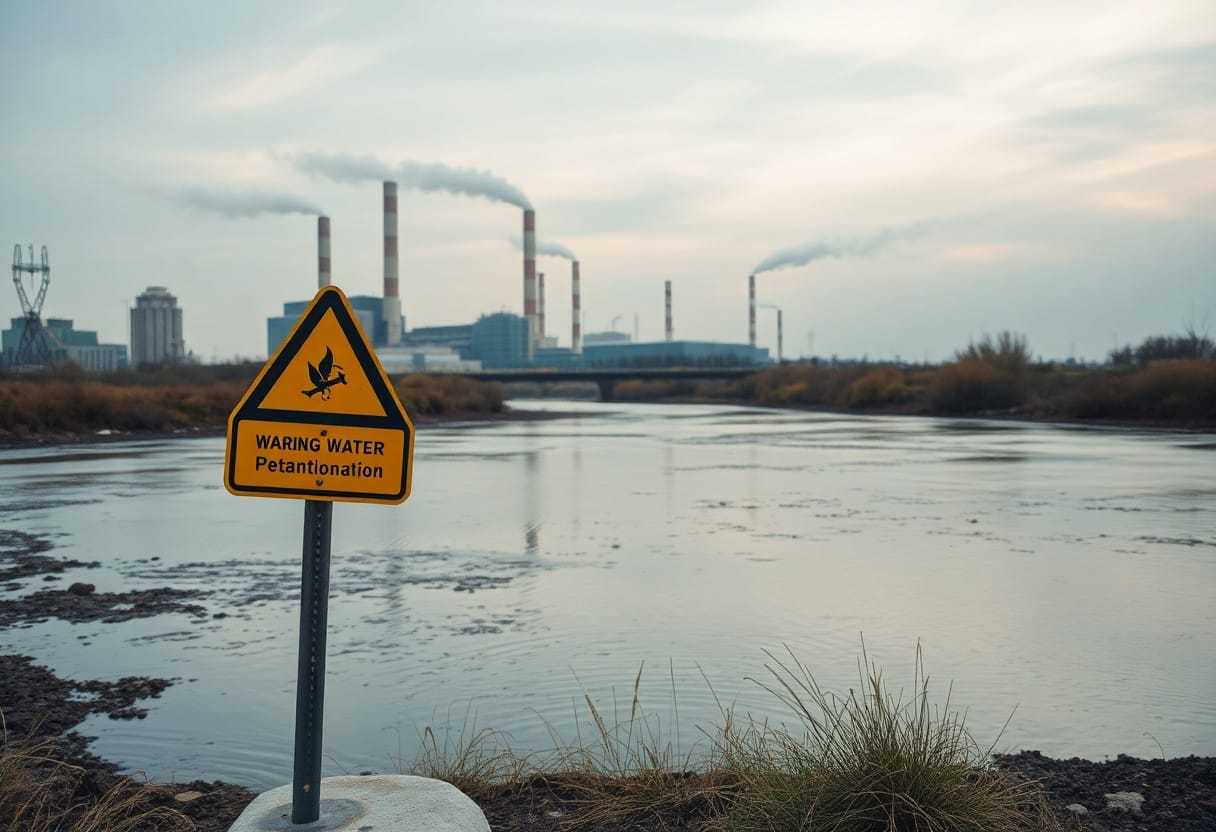Just as you navigate your daily life in Fayetteville, it’s vital to understand the hidden costs associated with Chemours’ pollution. The impact on your health, local environment, and property values cannot be overlooked. While the company may contribute to economic growth, the long-term consequences can lead to increased healthcare expenses and environmental degradation, affecting everyone in the community. By becoming aware of these hidden costs, you can better protect your interests and advocate for a cleaner and safer Fayetteville.
Overview of Chemours and Its Operations
Background of Chemours
Your understanding of Chemours begins with its foundation in 2015, as a spin-off from the DuPont company. This corporation specializes in the production of chemical products, particularly fluoroproducts and performance chemicals, and serves a variety of industries such as automotive, electronics, and construction. The company’s Fayetteville facility, one of the largest of its kind, focuses on the manufacturing of chemicals like zinc-based products, and the controversial per- and polyfluoroalkyl substances (PFAS), also known as “forever chemicals.” These substances are persistent in the environment and have been linked to numerous health issues, making Chemours a focal point of environmental and public health debates in North Carolina.
Industrial Practices in Fayetteville
Any discussion about the operations of Chemours in Fayetteville should include an examination of their industrial practices. The Fayetteville plant utilizes advanced manufacturing techniques, yet, these methods often come with challenging environmental implications. The facility manufactures a variety of chemical compounds, which can lead to pollution through the release of hazardous emissions into the air and water. Communities nearby have expressed concern regarding the discharge of contaminated wastewater and the impact it has on local water sources, increasing anxiety about the long-term effects on public health and the ecosystems surrounding the plant.
Chemours has faced scrutiny over its operational transparency and commitment to environmental sustainability. The use of chemicals classified as hazardous raises significant alarms among residents, who have reported health problems associated with the pollution attributed to the plant. Public disclosures regarding industrial wastewater management, emissions monitoring, and compliance with environmental regulations are critical as these practices directly affect your community’s health and well-being. Understanding these industrial practices and their consequences can empower you to advocate for cleaner alternatives and safer environmental policies in Fayetteville.
Environmental Impact of Pollution
Some people may not realize the extent of the harm caused by industrial pollution, particularly that from Chemours in Fayetteville. These pollutants have far-reaching consequences not just for the environment, but also for the health of communities. Regions affected by chemical runoff and airborne emissions often suffer from issues that may be less visible than the pollution itself. Understanding the specific types of pollutants released into the environment is necessary to grasp the full scope of the environmental degradation.
Types of Pollutants Released
For your awareness, Chemours has been cited for the release of various types of pollutants into the Fayetteville area, impacting air, water, and soil quality. Some of these pollutants include:
| Pollutant | Source |
| Per- and Polyfluoroalkyl Substances (PFAS) | Manufacturing processes |
| Mercury | Waste incineration |
| Volatile Organic Compounds (VOCs) | Chemical production |
| Particulate Matter (PM) | Fugitive emissions |
Any exposure to these pollutants can pose serious risks to both the ecosystem and public health, necessitating urgent remediation efforts to address their impact.
Effects on Local Ecosystems
Beside being a public health concern, the pollution resulting from Chemours heavily affects local ecosystems. Aquatic habitats receive runoff from production facilities that disrupt the delicate balance of the water bodies, while terrestrial ecosystems can be altered by soil contamination. Species that inhabit these areas face threats to their survival, and the biodiversity often suffers as a result.
Impact on local ecosystems is significant and far-reaching. The introduction of PFAS into water systems can alter species’ reproductive rates, while mercury can accumulate in the food chain, leading to toxic effects on animals. Pollutants such as VOCs and particulate matter contribute to air quality degradation, affecting both wildlife and human populations. The harmful effects often lead to a decline in species diversity which can have a profound effect on the overall health of the environment you depend on.
Health Implications for the Community
It’s crucial to understand the potential health implications of Chemours’ pollution, particularly concerning the exposure to toxic chemicals known as PFAS, or “Forever Chemicals.” These substances have been linked to various health problems, including certain cancers, liver damage, and reproductive issues. Many in your community are unaware that Producers of “Forever Chemicals” Knew They Were Toxic, … which raises alarming questions regarding the accountability of those responsible for their production. The long-term health risks associated with PFAS exposure demand your attention, as they could significantly impact your family’s well-being.
Air Quality Concerns
On top of concerns regarding water safety, the air quality in Fayetteville poses another serious health risk. Residents may be exposed to airborne pollutants resulting from Chemours’ operations, which can lead to respiratory issues and other health conditions. You might notice symptoms such as coughing, chest tightness, or even worsening asthma due to poor air quality. The correlation between the plant’s emissions and health problems in the community is an area that requires immediate attention.
Water Contamination Issues
Behind the troubling dialogue surrounding Chemours lies the issue of water contamination that has plagued Fayetteville for years. Local water supplies have shown concerning levels of PFAS, which can infiltrate drinking water systems, putting your health at risk. The presence of these chemicals in your water can lead to serious, long-term health problems, including developmental delays in children and increased cholesterol levels for adults. Protecting your access to clean water should be a top priority for both your community and local authorities.
Consequently, the urgency of addressing water contamination issues cannot be overstated. Your family’s access to safe drinking water and overall health depend on the swift and effective management of these chemical discharges. It’s vital to stay informed about local water testing results and advocate for comprehensive measures to eliminate PFAS from your environment. This proactive approach will help ensure a safer and healthier living space for you and future generations.
Economic Consequences
Property Values and Land Use
Economic impacts of pollution often extend beyond immediate health concerns, reaching into property values and land use. If you own property or are considering investing in real estate in Fayetteville, you may notice that homes and businesses near sites impacted by Chemours’ discharges are likely to see decreased property values. The stigma associated with pollution can deter prospective buyers, leading to longer selling times and potential financial loss for current homeowners. You may also find it challenging to secure financing or insurance, as lenders often factor in environmental risks when assessing property worth.
Furthermore, land use can be affected as well. If certain areas are designated as hazardous due to pollution, development opportunities may be restricted. You could face zoning regulations that limit what you can do with your property, stifling economic growth and the ability to capitalize on investments. This not only worsens your financial standing but also hampers the overall economic development of Fayetteville, limiting job creation and community revitalization efforts.
Healthcare Costs Associated with Pollution
Above the surface, you might find it easy to overlook the significant healthcare costs related to pollution. Chronic exposure to contaminants from Chemours can lead to a multitude of health issues, which ultimately burden local residents and taxpayers. The costs associated with hospital visits, long-term medication, and ongoing treatments can escalate rapidly. If you or someone you know has suffered health complications due to pollution, these expenses might weigh heavily on your finances.
Associated with the ongoing health challenges, many residents experience increased stress and anxiety stemming from uncertainty about their wellbeing. This can further prompt visits to healthcare facilities, thereby inflating costs not only for yourself but for local healthcare systems. The ripple effect can strain community resources and divert funding from other necessary services. Additionally, the long-term impacts of pollution might require targeted health interventions, further exacerbating financial burdens on individuals and communities alike.
Regulatory Framework and Accountability
For residents of Fayetteville, understanding the regulatory framework surrounding Chemours’ pollution is imperative for grasping how accountability is managed in your community. The oversight mechanisms in place are designed to ensure that companies like Chemours adhere to environmental standards, but the effectiveness of these agencies can often influence the extent of environmental degradation you may experience. Familiarizing yourself with the roles of both local and national environmental agencies will empower you to advocate for stricter regulations and enforcement.
Oversight by Environmental Agencies
With various environmental agencies tasked with monitoring pollution levels, you might feel a sense of reassurance that your health and environment are protected. However, the reality is that the enforcement of regulations can vary widely, often depending on resource allocation and political will. In Fayetteville, agencies like the North Carolina Department of Environmental Quality (NCDEQ) are responsible for overseeing emissions from the Chemours facility, but their ability to take swift action may be hampered by bureaucratic processes and budget constraints.
Legal Actions and Community Response
The ongoing struggle between Chemours and the Fayetteville community has seen numerous legal actions taken in response to pollution allegations. Individuals and local advocacy groups have united to hold Chemours accountable, often feeling compelled to seek redress through the courts when governmental oversight appears insufficient. These actions illustrate the collective determination of community members who are unwilling to accept pollution as an inevitable consequence of industrial activity.
But despite these legal victories and community efforts, the threat of ongoing pollution remains a reality for many Fayetteville residents. Legal battles can be lengthy and require significant resources, often leaving you at the mercy of the outcomes, which can be uncertain. However, the positive news is that increasing public awareness and community activism continue to shine a light on the situation, promoting dialogue about environmental justice and urging both lawmakers and corporations to prioritize public health over profit. By staying informed and involved, you can be part of the movement demanding accountability and change.

Community Perspectives and Activism
Keep in mind that the pollution from Chemours has ignited a passionate response from the local community. Residents are increasingly vocal about their concerns, demanding accountability and transparency from the company. Recently, it was reported that Chemours blew deadline to build an underground wall meant to halt toxic contamination of the Cape Fear River. This delay adds to the growing unease surrounding the environmental integrity of your community, compounding worries about health risks related to the water supply. It highlights the urgent need for effective local advocacy to ensure that your rights and well-being are prioritized over corporate interests.
Local Activist Groups
Below the surface of this ongoing battle against pollution, various local activist groups have emerged to champion the rights of affected residents. These organizations play a vital role in educating the public about the implications of Chemours’ actions and foster community engagement in environmental issues. You may find these groups organizing protests, educational seminars, and community cleanups, as they actively work to create a healthier and safer environment for all. Their determination not only amplifies your voices but also forms a network of support that strengthens the collective resolve against industrial negligence.
Public Awareness Campaigns
Below the surface of environmental issues lies a powerful movement driven by public awareness campaigns aimed at informing and empowering your community. These campaigns strive to spread knowledge about the dangers of chemical contamination and prompt individuals to take action collectively. By leveraging social media, local media outlets, and community gatherings, these initiatives are designed to inspire you to advocate for clean water and environmental justice. Furthermore, they increase your understanding of the potential health impacts caused by pollutants, thus fostering a more informed and engaged citizenry.
Local advocacy groups are also focused on raising awareness through initiatives that encourage conversations around pollution and health risks among residents. They work tirelessly to share information about the adverse effects of per- and polyfluoroalkyl substances (PFAS), which are often found in the water sources you rely on. By disseminating facts on how these chemicals can threaten your health and the environment, these campaigns aim to galvanize a movement for change. The goal is to turn your heightened awareness into activism, pushing for reforms that safeguard your community from further harm.
To wrap up
Ultimately, understanding the hidden costs of Chemours’ pollution in Fayetteville is vital for you as a resident and stakeholder in the community. The long-term health and environmental impacts represented by this pollution can extend far beyond the immediate effects, influencing the quality of water, air, and soil. The deterioration of natural resources and the ensuing public health crises also carry significant economic burdens, potentially affecting property values, healthcare costs, and local economies. It’s vital for you to recognize how these factors intertwine and manifest in your daily life and community well-being.
Moreover, acknowledging these hidden costs empowers you to advocate for better corporate practices and stronger regulations. By demanding transparency and accountability from companies like Chemours, you can help foster a healthier environment and advocate for sustainable solutions that will benefit future generations. As you engage with your community and local government on these issues, your voice becomes a powerful tool for change, ensuring that environmental justice is at the forefront of discussions surrounding industrial pollution in Fayetteville.


















